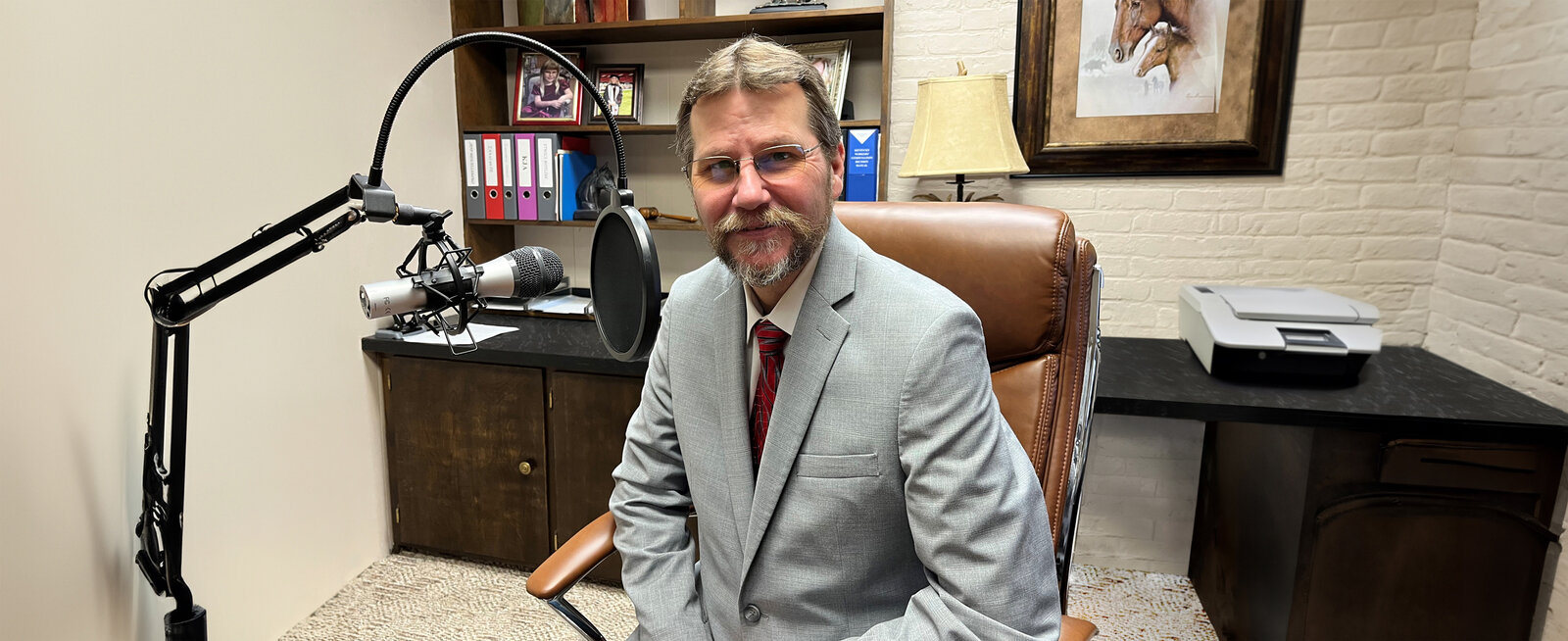Episode 48: Western Kentucky injury attorney Jeff Roberts discusses back injuries and other problems that may qualify for Social Security Disability Insurance (SSDI) benefits. He’s licensed to handle social security disability cases in all 50 states. Let’s join Jeff for more information.
30 Years Spent Helping to File Social Security Disability Claims
Jeff Roberts has significant experience helping his clients to file for SSDI benefits. Many of them are related to back injuries. He has offices in Calloway County (Murray) and in Christian County (Hopkinsville).
Jeff’s practice focuses on injuries. He handles workers’ compensation claims and personal injury cases, in addition to the social security disability claims. Often, the first two may lead to a claim for social security benefits. Depending upon work history, many back injuries may qualify for social security disability insurance benefits.
Interestingly, Jeff can file a workers’ comp claim and a social security disability claim at the same time. He can file a personal injury clam and a social security disability claim at the same time. In certain situations, Jeff may actually be able to file all 3 types of claims at the same time, for the same injury.
What Is Social Security Disability Insurance (SSDI)?
Jeff explains the Social Security Administration handles two specific programs, SSDI and Supplemental Security Income (SSI). Social Security Disability benefits are paid out based on what a person has paid into the system through their federal withholdings (FICA). There are requirements regarding how many quarters you spent contributing. Your benefits are based on the amount contributed. SSI is paid out based on financial need, even if you’ve never worked. There are strict limitations to qualify for SSI benefits. Jeff comments that it’s possible for an individual to qualify to receive both SSDI and SSI.
SSI recipients are put on Medicaid. SSDI recipients will be put on Medicare, after a period of 2 years receiving disability.

Different Types of Spinal or Back Injuries
Most people have some type of degenerative disease due to the aging process. It’s a natural occurrence. Bulging disks often result in severe pain. Spinal stenosis is a condition resulting in the narrowing of the spinal canal through which the nerves run. As the canal gets narrower, it can cause pain to the nerves. Bone spurs can also come into contact with the nerves, resulting in pain. A pinched nerve is a common condition causing discomfort. The pain may radiate to the extremities to such as the hands, legs, feet, etc.
Spinal fractures can also result from a low-back injury. Lower back injuries are more common than people realize. They often happen as a result of a work-related injury or a car wreck.
Severe scoliosis is another back condition that may result in Social Security Disability Insurance benefits. It may require numerous surgeries and related issues. A spinal fusion may be required, which limits mobility and a person’s range of motion. As the areas of the spine both above and below the fusion attempt to compensate for the lack of motion, it can accelerate the deterioration of those areas. This can be referred to adjacent segment disease.
Life-Altering Back Surgeries
Jeff explains that spinal surgeries, especial low-back surgeries, can often be life altering. Over the past 30 years, he’s seen many people who still have back pain, long after the surgery. Cervical spine procedures, in Jeff’s experience, tend to resolve the pain more than a surgery to the lower back.
Any spinal surgery can lead to some level of disability. It may be partial disability or total disability. Because some back injuries may qualify for Social Security Disability Insurance, SSDI can provide a safety net for the individual who can no longer do the same job (i.e. construction) or return to work at all.
Applying for Social Security Disability
The process requires that your condition is disabling for greater than 12 months. If you return to work, following your surgery, before the 12-month period, you would not necessarily qualify for SSDI. It’s also a question of how long the condition is expected to last.
You may be able to rely on your short-term or long-term disability policy to supplement your income during your recovery period.
Social Security is going to review your medical records, so it’s important that you continue seeking medical care and/or treatment for your back injury. If you have stopped, it may raise a question as to the severity of your condition. It could lead to a denial of your claim.
Social Security may also decide to send you to a doctor for a consultative examination. That doctor will report back to the Social Security Administration and it will have a bearing on the decision.
Your attorney will try to prove 1 of 2 primary factors:
- You meet the Listings of Impairment. These are a set of conditions that would automatically qualify you for disability. Jeff discussed this topic in Episode 37.
- Your restrictions limit your ability to function at work. Social Security refers to this as your “Residual Functional Capacity.” The extent of these work restriction will have an impact on your level of disability.
The Standards Change with Age
Regarding the residual functional capacity, Jeff explains that the criteria used actually change depending upon the age of the injured person. At age 50 and then again at age 55 there are changes making it somewhat more likely you’d qualify. However, if you’re in your 30s, it’s assumed you may be able to find another job requiring less lifting or movement. This is especially true when compared to an older person whose performed manual labor for the majority of his/her career.
Your educational background will also be considered. If you have a degree, you may be able to transition into some type of job that would enable you to generate adequate income.
Can I Go Back to Work after Being Disabled?
Yes. Social Security has a program enabling you to attempt to return to work, without having to go the entire process, again. If you’ve been on social security disability and want to return to work, you need to notify the Social Security Administration so they can monitor it. You have approximately 9 months to test it out.
If you are able to successfully return, the benefits will be phased out. However, if you are unable to stay at work, the Administration will update the file and you will be able to maintain your disability benefits. Jeff spoke about this topic in Episode 42.
Jeff Can Handle Social Security Cases in all 50 States
The Social Security Disability Insurance (SSDI) and Supplement Security Income (SSI) are federal programs. As an attorney, Jeff is licensed to handle these cases in all 50 states. He recently was involved in a claim in Oklahoma.
The workers’ compensation and personal injury areas of his practice are limited to Kentucky, unless there is a Kentucky connection for the claim. It that case, such as a person who lives in Tennessee, but was injured working for a Kentucky employer, he may be able to represent that individual.
Jeff Roberts Represents Injured Clients Throughout Kentucky
With offices located in Calloway County and now Christian County, Jeff has a history of representing personal injury clients, workers’ compensation clients and social security disability clients across the state. He’s represented clients from Paducah, Bowling Green, Louisville, Covington, Whitesville and many other Kentucky locations. He’s not just a Western Kentucky injury attorney.
We hope you found this episode insightful and helpful. Thank you for listening!
Is It Time to Speak with an Attorney about Your Back Injury Claim?
The office phone number is (270) 753-0053 or toll free at 800-844-5108. For more information, visit www.JeffRobertsLaw.com. This podcast is meant to provide information and is not legal advice. Jeff’s principal office is located at 509 Main Street, Murray, Kentucky. Co-host Jim Ray is a non-attorney spokesperson. This is an advertisement.





